If a kitchen could only have a few herbs stocked within it, basil should be one of them. Its fragrant essence combines well with rosemary and thyme in meat dishes, fish, vegetables, cheese, soup and eggs, and is one of the main ingredients in pesto, along with pine nuts and parmesan cheese.
There are more than 60 varieties of basil, each offering a subtle difference in taste, with varieties such as lemon, clove and cinnamon lending unique flavor to recipes. Sweet basil is the most popular and commonly used variety, and Thai basil is used often in recipes that call for anise-like flavors.
Basil plants are easy to maintain both indoors and out. They thrive in rich soil under full sun, and can be harvested after 60 to 90 days from seed. Snip off budding heads when the plant reaches at least 6 inches in height to keep your plant bushy.
When shopping for basil, look for vibrant green leaves that have no signs of decay. Basil is best enjoyed fresh, but if you have too much on hand and you wish to preserve it for later, avoid washing the leaves. Instead, layer them on a damp paper towel, before placing them inside a resealable bag in the refrigerator, where they should keep for up to four days. If your basil still has stalks attached, place it in a glass of water and cover it before storing inside the refrigerator.
Health Benefits of Basil
Basil is considered one of the healthiest herbs. Used fresh, it exudes a sweet, earthy aroma that indicates not only the promise of a pleasant flavor, but an impressive list of nutrients. Among them is vitamin K, a fat-soluble vitamin essential for adequate blood clotting, healthy cardiovascular function and bone development.
Basil provides beta-carotenes, which are powerful antioxidants that may help protect your cells from free radical damage, as well as lowering your risk for various diseases, including cardiovascular disease and cancer.
Basil is an excellent source of flavonoids and volatile oils. Among these are estragole, linalool, eugenol, sabinene, myrcene and limonene, which have antioxidant and anti-inflammatory properties. A study published in the Journal of Agricultural and Food Chemistry found that these oils may provide antimicrobial activity against various bacteria, yeast and mold.
Other notable vitamins and minerals in basil include iron, calcium, manganese, magnesium, vitamin C and potassium. For more information about the nutritional content of basil, check out the nutrition facts table below:
| Basil Nutrition Facts
Serving Size: 3.5 ounces (100 grams), fresh |
||
| Amt. Per Serving |
||
| Calories | 23 | |
| Total Fat | 0.64 g | |
| Saturated Fat | 0 g | |
| Trans Fat | ||
| Cholesterol | 0 mg | |
| Sodium | 4 mg | |
| Total Carbohydrates | 2.65 g | |
| Dietary Fiber | 1.6 g | |
| Sugar | 0.3 g | |
| Protein | 3.15 g | |
| Vitamin A264 mcg | Vitamin C | 18 mg |
| Calcium177 mcg | Iron | 3.17 mg |
Studies Done on Basil
A study published in the Journal of Microbiological Methods tested the effect of basil oil in diluted concentrations against several common but serious multidrug-resistant bacteria, including Staphylococcus, Enterococcus and Pseudomonas. Results showed that the bioactive components in basil have a “strong inhibitory effect” against the test bacteria.
Another study published in the Journal of Ethnopharmacology evaluated the traditional use of basil to help relieve several respiratory diseases and the symptoms of tuberculosis, exploring the possible use of basil against actual tuberculosis symptoms. Test results were affirmative, with the conclusion that basil may be used to formulate new and natural anti-tuberculosis treatments.
The hypoglycemic effect of basil aqueous extract was tested in a study published in Toxicology and Industrial Health. Results showed that its antioxidant activity and ability to help inhibit alpha-glucosidase and alpha-amylase may be useful for controlling diabetes.
Basil, as well as thyme, may even help ensure the safety of the fresh produce you bring to your table. According to a study published in the Journal of Food Protection, washing produce in a solution of basil or thyme essential oil at 1% concentration helped diminish the number of infectious Shigella bacteria, which can produce intestine-damaging diarrhea.
Basil Fun Facts
Basil was used by ancient Egyptians and Greeks for embalming, and was also a symbol of mourning in Greece, where it was called “basilikon phuton”, meaning magnificent, royal or kingly. Basil also has a long history of use in Ayurveda, while in Jewish folklore, it is believed to increase strength while fasting.
Summary
Basil is arguably one of the best herbs to use in cooking, especially because it has so many uses. Everything from soups to sandwiches can be improved with the addition of its fresh, pungent leaves. It also contains oils and flavonoids that may help protect the body from illness and infection. Very small concentrations may kill harmful bacteria, and may be beneficial even for lowering your risk of cardiovascular disease and cancer.

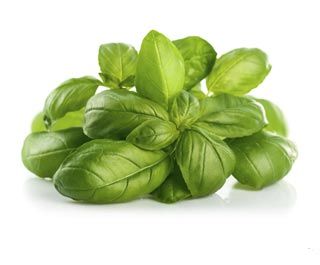
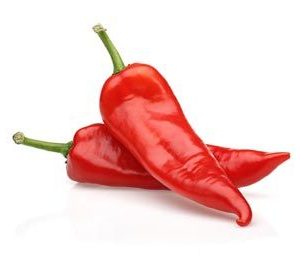
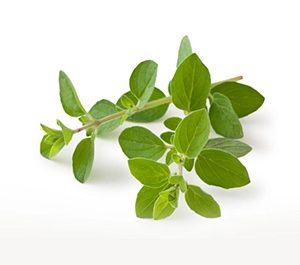
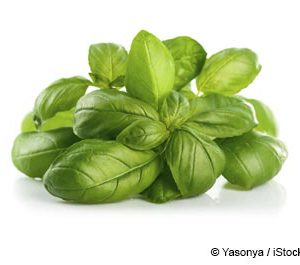
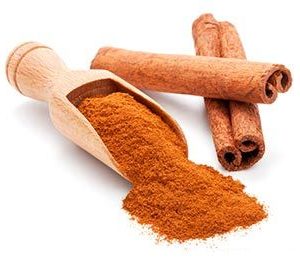
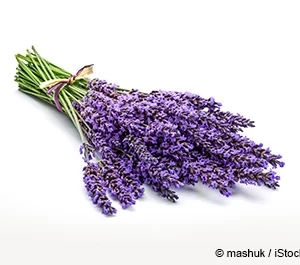
Reviews
There are no reviews yet.